资产阶级革命时期英国文学
刘炳善《英国文学简史》(第3版)笔记和考研真题详解-第3章 英国资产阶级革命时期【圣才出品】
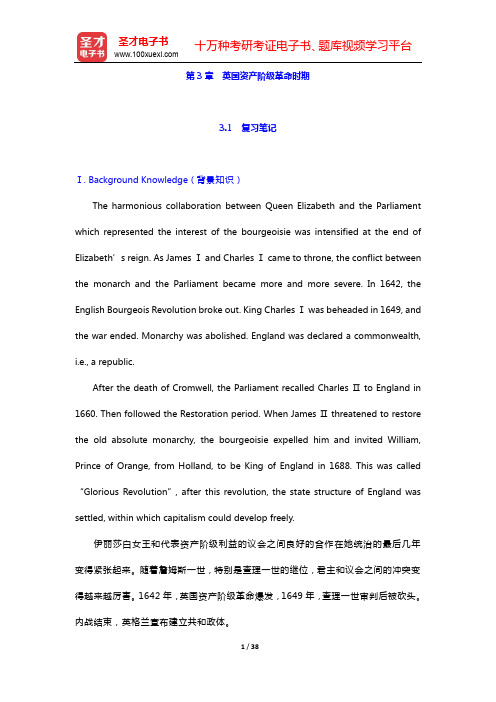
第3章英国资产阶级革命时期3.1 复习笔记Ⅰ. Background Knowledge(背景知识)The harmonious collaboration between Queen Elizabeth and the Parliament which represented the interest of the bourgeoisie was intensified at the end of Elizabeth’s reign. As JamesⅠ and Charles Ⅰ came to throne, the conflict between the monarch and the Parliament became more and more severe. In 1642, the English Bourgeois Revolution broke out. King Charles Ⅰ was beheaded in 1649, and the war ended. Monarchy was abolished. England was declared a commonwealth, i.e., a republic.After the death of Cromwell, the Parliament recalled Charles Ⅱ to England in 1660. Then followed the Restoration period. When James Ⅱ threatened to restore the old absolute monarchy, the bourgeoisie expelled him and invited William, Prince of Orange, from Holland, to be King of England in 1688. This was called “Glorious Revolution”, after this revolution, the state structure of England was settled, within which capitalism could develop freely.伊丽莎白女王和代表资产阶级利益的议会之间良好的合作在她统治的最后几年变得紧张起来。
英国文学

1653年,克伦威尔在全国建立起了军事独裁制度,但他 死后不久(1600),英国又恢复了以往的君主专制制度 ,这就是所谓的”王政复辟时期”。 詹姆斯二世准备重新建立一个政教合一的专政国家,让女 儿玛丽的丈夫威廉到英国继承王位,从而导revolution meat three things: 1.the supremacy of Parliament; 议会成为英国最高权力机构; 2.the beginning of modern England; 现代英国开始真正形成; 3.The final triumph of the principle of political liberty for which the Puritan had fought and suffered hardship for a hundred years. 政治自由获得最终的胜利,为此清教徒整整奋斗了 100年。
詹姆斯一世
查理一世
Against this royal arrogance, the Puritans offered another theory of divine right , the divine right of the individual conscience. They renounced a life of joy in this world , in hope of an eternal joy in the world to come. 针对王室的专横,清教徒提出了新型的神权理论 ——个人良知神权论。他们放弃在现实世界的幸福 生活,寄希望于来世获得幸福。
Elizabeth I died in 1603 and James I came to the throne. The government of James I was a despotism based upon the theory of the divine right of kings. In the next reign(Charles I succeeded James I in 1625) the religious tyranny of Archbishop William Laud was added to the political tyranny of the king. 1603年,伊丽莎白女王去世,詹姆斯一世继位。 他相信君权神授,专横暴虐。1625年,查理一世 继詹姆斯一世位,大主教劳德推行宗教专制,加剧 了国王的政治专制。
英国文学简史Part Three The Period of the English Bourgeois Revolution

Part Three The Period of the English Bourgeois Revolution第三部分英国资产阶级革命时期I The English Revolution and the Restoration 英国革命和复辟Literature of the Revolution Period 革命时期的文学:The spirit of unity and feeling of patriotism ended with the reign of Elizabeth I, and England was then convulsed with the conflict between the two antagonistic camps, the Royalists and the Puritans. English literature of this revolution and restoration period was very much concerned with the tremendous social upheavals of the time. Milton, one of the greatest poets of England, defended the English Commonwealth with his pen.随着伊丽莎白一世统治的结束,人们统一的精神和爱国主义的感情也随之而去。
英国因为量大对抗阵营——保皇党和清教徒的冲突而骚乱。
英国革命和复辟时期的文学主要与当时的社会巨变有关。
英格兰最伟大的诗人之一弥尔顿用他的笔来捍卫英国共和制。
II Milton 弥尔顿1.Life and Work 生平和作品(1)Life: John Milton was born in London in 1608.约翰·弥尔顿1608年出生于伦敦。
英国文学简史
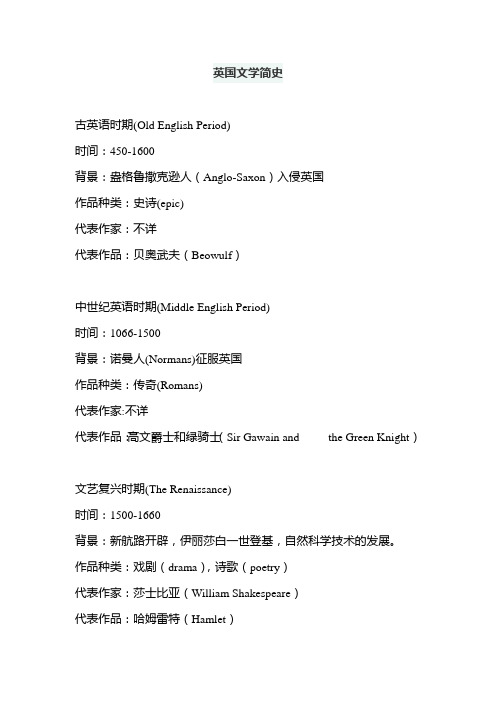
英国文学简史古英语时期(Old English Period)时间:450-1600背景:盎格鲁撒克逊人(Anglo-Saxon)入侵英国作品种类:史诗(epic)代表作家:不详代表作品:贝奥武夫(Beowulf)中世纪英语时期(Middle English Period)时间:1066-1500背景:诺曼人(Normans)征服英国作品种类:传奇(Romans)代表作家:不详代表作品:高文爵士和绿骑士(Sir Gawain and the Green Knight)文艺复兴时期(The Renaissance)时间:1500-1660背景:新航路开辟,伊丽莎白一世登基,自然科学技术的发展。
作品种类:戏剧(drama),诗歌(poetry)代表作家:莎士比亚(William Shakespeare)代表作品:哈姆雷特(Hamlet)17世纪时期(The 17th Century)时间:1603-1688背景:资产阶级革命与复辟时期作品种类:散文(essay),史诗(epic),寓言故事(allegory),诗歌(poetry)代表作家:弥尔顿(John Milton)代表作品:失乐园(paradise lost)新古典主义时期(The Neoclassical Period)时间:1660-1785背景:启蒙运动作品种类:散文(essay),小说(novel),诗歌(poetry)代表作家:亚历山大.蒲泊(Alexander Pope)代表作品:An Essay on Man浪漫主义时期(The Romantic Period)时间:1798-1832背景:法国大革命,工业革命作品种类:诗歌(poetry)代表作家:雪莱(Percy Bysshe Shelley)代表作品:西风颂(Ode to the West Wind)维多利亚时期(The Victorian Period)时间:1832-1900背景:维多利亚女王统治时期,资本主义经济发展,自然科学的发展作品种类:小说(novel)代表作家:狄更斯(Charles Dickens)代表作品:远大前程(Great Expectations)现代主义时期(The Modern Period)时间:1914-1965背景:第二次世界大战,人们对西方文明的危机感作品种类:诗歌(poetry),小说(poetry)代表作家:艾略特(T.S Eliot)代表作品:荒原(The Waste Land)The Middle English PeriodGeoffrey ChaucerSpecial featuresThe first most significant poet in English literary history to write in Middle English.Help perfect English language as as a literary medium.A first rate story-teller. Reading him can be an immensely enlightening and educational experience.Points of viewEnormous sense of humor.Loyalty to reality. A master of realism.Infinite sense of humanity.Major WorksCanterbury TalesA collection of 20-odd stories.Similar with Boccacio’s Decameron.Including 20 complete stories and 4 fragments---already an amazing number.People come from virtually all walks of life. A picture of 14-century English life.Place women on an equal footing with men.(“The Wife of Bath’s Tale” What is that women desire most?)Prominence: The holy orders and the middle classThomas MoreSpecial featuresThe wisest and noblest person that lived then.Privy councilor to the king.Beheaded by the king because of he did not go along with the king’s divorce.Points of viewMore was first and foremost a humanist at heart.Major WorksUtopiaLook forward to the future of man.Offer an ideal which has inspired generations of serious social thinkers. An imaginary country where democracy replaces tyranny, commonwealth replaces private property.Its strict adherence to conformity, simplicity and monotony is totally incompatible with human nature, and curbs individual rights and freedom.Its slavery system goes against individual dignity and self-worth.The utopian society is clearly male-dominated.RenaissanceSpenserSpecial featuresOne of the most important English poets.Milton calls him his “poetic father”Points of viewDetermined to revive Chaucer’s poetic legacy and reinvent English poetry.Conformed to morality and Christian dogmas.Major WorksThe Faerie QueenA grand epic poem“The only long poem that a lover of poetry can sincerely wish longer”Picturesque, rhyme, theme, plot.William ShakespeareSpecial featuresMost popular and most widely respected writer in all English literature. Careful rumination over human condition andsupreme understanding of human nature.His poets drew great attention for their grace in form, depth in thought, and vivacity in tone.His dramatic works:Early period:histories and comediesMiddle period:tragicLate period:Romances&serenityPoints of viewHis universe is a veritable microcosm of the human world, where all types of people exist.He has the common life of the common run of mankind in mind in his literary creations.His cosmos is highly moral with a sense of certitude and justice.He sees reflection of life as legitimate job of a playwright.Major WorksBlack comedyIndividual worthA faithful record of the mood and tenor of the timesFrancis BaconSpecial featuresHis inductive method of reasoning and learning; he valued experience and observation.His prose is fresh, vigorous, powerful, and aphoristic so that he was able to dominate English prose for decades.Bacon’s essays was the first of its kind to appear in English literature. Major WorksHuman nature, political concerns and socio-economic ideas.John MiltonSpecial featuresThe third greatest English poet after Chaucer and Shakespeare.The greatest to come out of the 17th century.His experience with the telescope helped him visualize haven, earth and hell.Major WorksParadise Lost made its author the greatest modern epic poet in English literary history.About biblical story of creation.Samson Agonistes was patterned on Greek tragedies.The character of Samson offers an obvious outlet of self-expression for the poet who resembled the biblical hero in more than one way. Lycidas has certainly proved to be a frame of reference for the writing of the genre of pastoral elegies.John BunyanSpecial features“No one can please God more than I do.”He was known as “Bishop Bunyan”.His prose has a striking modern ring. It has paved the way for the rise of the modern English novel.He became a great force in the history of English prose without ever desiring it.Major WorksThe Pilgrim’s Progress is an allegory.A medieval miracle play with vivid and lively personifications of virtues and vices and all the human qualities in between.The Classic AgeThomas GraySpecial featuresA poet of transition form the neoclassic to the Romantic period.A forerunner of the Romantic movement both in subjects and simple language.Gray is famous for his letter writing.Oliver GoldsmithSpecial featuresGoldsmith is prone to a kind of idealizing and sentimentality that is always easy for modern people to comprehend.Points of viewGoldsmith’s poem was written in the fashionable heroic couplet of the time.The author’s sentiments of grief and nostalgia are genuine and convincing.Major WorksShe stoops to conquerAs a satire on the artificial and pretentious behavior of the day, the play exalts the quality of t ruth and honest feeling.The salutary influence the play exercised on the 18th century is considerable.Goldsmith’s dialogues are vivacious and immensely humorous, and the whole performance impressed the audience with its vitality and joyful mood.The Vicar of WakefieldHis wit, humor, his craft of planning ballads and tales within tales, and his philosophical depth, which all make for the fascination it holds for its readers, modern as well as ancient.William BlakeSpecial featuresAn important landmark in between two literary periods, pointing directly to that of Romanticism.His poets: his social events and his mysticism.He is noted or his originality both in theme and form.Points of view“Without contrast and contraries, there is no progression.”Blake was basically a visionary. His fight was a “mental” fight, one that he hoped would restore England to spiritual and social health.Major WorksBy far his most powerful and the most permanent are Songs of Innocence and Songs of Experience.Jonathan SwiftSpecial featuresThe literary king of his day. He wrote a lot of powerful satirical essays and books.His lucid and terse prose has contributed not a little toward the development of the best English prose tradition.Points of viewHis satires on human institutions and social ills were all meant tohelp improve the lot of man.Major WorksGulliver’s TravelsGulliver is a man observant to all the 18th century values, while Swift was, on the other hand, a man intensely critical of his time.The author is different from the narrator, and the author would like people to think twice about what Gulliver disapprove of. Gulliver is part of the author’s satire.Daniel DefoeSpecial featuresA firm supporter of the Glorious Revolution.Points of viewHis views on the novel focus on its realism and aesthetic.“Any story failing to deal with the human experience is pure fiction and a lie.”His protagonists are common people with real common names and speak as “I”, telling their own stories in the first-person narrative.As a moralist, he wrote with the conviction that his works wouldbe educational and help people behave.Major WorksRobinson CrusoeA middle class book, offering justifications for the class’forthcoming rise to pre-dominance in national life.A typical show of Puritan individualism.(self-reliance andhard-working)The creation of the world and and self-identity.An ordinary humankind’s self-made success.。
王守仁《英国文学选读》(第4版)配套题库-章节题库-第4、5单元【圣才出品】
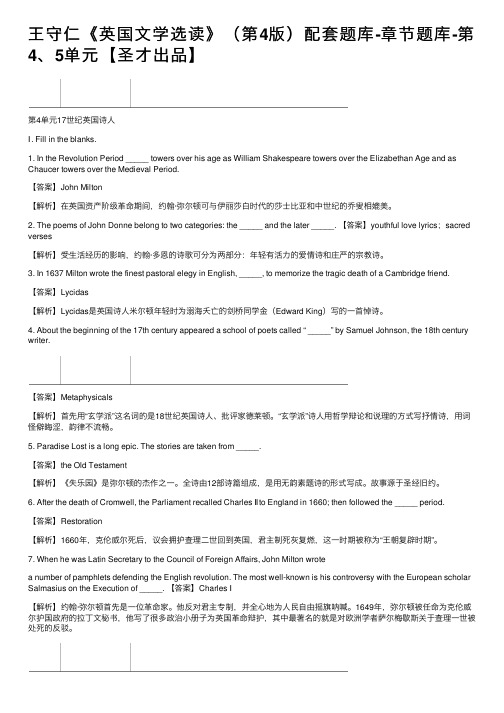
王守仁《英国⽂学选读》(第4版)配套题库-章节题库-第4、5单元【圣才出品】第4单元17世纪英国诗⼈Ⅰ. Fill in the blanks.1. In the Revolution Period _____ towers over his age as William Shakespeare towers over the Elizabethan Age and as Chaucer towers over the Medieval Period.【答案】John Milton【解析】在英国资产阶级⾰命期间,约翰·弥尔顿可与伊丽莎⽩时代的莎⼠⽐亚和中世纪的乔叟相媲美。
2. The poems of John Donne belong to two categories: the _____ and the later _____. 【答案】youthful love lyrics;sacred verses【解析】受⽣活经历的影响,约翰·多恩的诗歌可分为两部分:年轻有活⼒的爱情诗和庄严的宗教诗。
3. In 1637 Milton wrote the finest pastoral elegy in English, _____, to memorize the tragic death of a Cambridge friend.【答案】Lycidas【解析】Lycidas是英国诗⼈⽶尔顿年轻时为溺海夭亡的剑桥同学⾦(Edward King)写的⼀⾸悼诗。
4. About the beginning of the 17th century appeared a school of poets called “ _____” by Samuel Johnson, the 18th century writer.【答案】Metaphysicals【解析】⾸先⽤“⽞学派”这名词的是18世纪英国诗⼈、批评家德莱顿。
英国文学资产阶级革命时期

Chapter 1 The English Revolution and Restoration1. Queen Elizabeth I died leaving no heirs, thus ending the Tudor dynasty.2. James I became the new king in 1603.–Began the Stuart line of kings–Great Britain became the United Kingdom3. Believed in the Divine Right of Kings.-- God made him king and God alone can tell him what to do.-- Did not allow Puritans to make changes in the Church of England or to challenge his authority.-- Caused friction with Parliament used to working with the monarch.-- When Parliament complained, Charles disbanded it for 11 years.4. The English Civil War (1642--1649)⏹The King’s supporters-- Called Cavaliers-- Mostly Anglicans, Catholics-- Mostly landed nobility⏹The Parliament’s supporters-- Called the Roundheads-- Mostly Puritans-- Mostly middle class5. The Commonwealth6. The Restoration(1660-16887. The Glorious Revolution (1688)⏹Charles II died in 1685, his brother James was his successor.⏹James II was Roman Catholic, who believed in divine right .⏹James II was expelled by Parliament.⏹William from Holland became the King.⏹Constitutional MonarchyJohn Donne (1572-1631)---the founder of the Metaphysical schoolI. Metaphysical Poetry•Metaphysical Poetry(玄学派诗歌)•It is the poetry of John Donne and other seventeenth-century poets who wrote in a similar style. Metaphysical poetry is characterized by verbal wit and excess, ingenious structure, irregular meter, colloquial language, elaborate imagery, and metaphysical conceits and a drawing together of dissimilar ideas.•Example: compare love bt. Husband and wife with compass.;•dislike traditional poem•Scholar, Highly abstract or theoretical;•Example:“It sucked me first, and now sucks thee,And in this flea, our two bloods mingled be;This flea is you and I, and thisOur marriage bed, and marriage temple is”Cavalier Poets(保皇派诗人)•Cavalier poets were often courtiers.•The Cavalier poets wrote light poetry, polished and elegant, but often superficial. They mostly dealt in short songs on the flitting joys of the day, but underneath their light-heartedness lies some foreboding of impending doom. This spirit of pessimism and cynicism is typical of the aristocratic class in decline.PART THREE: THE PERIOD OF THE ENGLISH BOURGEOIS REVOLUTIONChapter 1. The English Revolution and the RestorationⅠ. The Weakening of the Tie Between Monarchy and Bourgeoisie:During the Tudor dynasty (1485-1603) the English bourgeoisie lived in harmony with the Crown. Until about 1590, the bourgeoisie had many interests in common with those of the monarchy —in the struggles against Spain, against the Roman Catholic Church, against noble houses ruining the country with their civil wars. Hence the collaboration between the monarchy and the bourgeoisie. But when all its internal and external foes had been crushed, the bourgeoisie ceased to depend upon the protection of the monarchy. At the same time the Crown strove to consolidate its position before it was too late. There had already been some conflict between the Queen and Parliament at the end of Elizabeth's reign. There were more and more quarrels of James I and Charles I with their Parliaments.Ⅱ. The Clashes Between the King and Parliament:The major parliamentary clashes of the early 17th century were over monopolies, the means by which the monarchy attempted to control commercial activity in the interests of the court.The king granted monopolies on such and such merchandises to his favourites, and then nobody could sell them without purchasing the permission of the monopoly holders. This caused grave inconvenience to merchants and a sharp rise in prices. And monopolies were extended in the reigns of James I and Charles I on such necessities as butter, herrings, salt, beer, and many others.At last the Parliament declared that monopolies without its consent were illegal. Charles I dissolved it in 1629. For eleven years Charles ruled the country with an absolute government. He relied upon the prerogative courts (the Star Chamber, etc.) as the instruments of his policy.Severe persecutions hit the capitalist class as a whole. Thus arose the demand for a new government on the part of the English bourgeoisie.Ⅲ. The Outburst of the English Revolution:The various classes in England soon split up into two camps. The opposition leaders in Parliament were supported by contributions of merchants, the mass demonstrations of artisans and apprentices in the city, and by the peasants' riots against enclosures in the countryside. While around the King were clustered the conservative gentry, the big landlords and the monopolists. A civil war broke out in 1642 and lasted till 1649.At first, the Royalists had certain military advantages. Then Oliver Cromwell (1599-1658), the famous opposition leader, reorganized the Parliamentary forces into the New Model Army. Once properly organized, the Army advanced rapidly to victory and the Royalists were decisively routed in Naseby in 1645. The war soon ended and Charles was captured. But he escaped from captivity, and civil war broke out again until the King was re-captured and executed in 1649, as "a public enemy to the good people of this nation." Monarchy was abolished. England was declared a commonwealth, i.e., a republic.Ⅳ. The Split within the Revolutionary Camp:As soon as victory was won, there arose a split in the revolutionary camp. First, the middle bourgeoisie (Independents) struggled with the big bourgeoisie (Presbyterians) for the supremacy in Parliament. Then the bourgeoisie as a whole broke with the people. So class struggle became complicated under the new situation.The Levellers, a section of the petty bourgeoisie, maintained that "the poorest he that is in England hath a life to live as the greatest he", and wanted manhood suffrage. But the Independents, who represented the bourgeoisie, answered: "Liberty cannot be provided for in a general sense." The ordinary people who previously fought for the Parliament were now disappointed; they felt they had been betrayed. A revolt of the Levellers broke out and was put down by Cromwell.At the same time arose the movement of the Diggers who preached a rural communism and led the poor peasants to dig up the waste land in several places. But this was also suppressed by the landlords and soldiers. Gerard Winstanley (1609-52?), leader of the Diggers, wrote: "Every one talks of freedom, but there are but few that act for freedom, and the actors of freedom are oppressed by the talkers and verbal professors of freedom." The full realization of the people's democracy is impossible unless there is a working class to carry it out thoroughly.Ⅴ. The Bourgeois Dictatorship and the Restoration:Thus the bourgeois dictatorship was established, and Cromwell became the Protector of the English Commonwealth. But the breach of the big bourgeoisie with the popular forces meant that their government could only be maintained by a compromise with the feudal remnants. After the death of Cromwell, the Parliament recalled Charl es Ⅱ to England in 1660. Then followed the Restoration period. A white terror was introduced to the country. Many Republicans were put to death. Most notorious was Jeffreys, the Chief Justice of Charles Ⅱ and James Ⅱ. He alone executed hundreds of innocent people. But the big bourgeoisie was more afraid of the people's revolution than of the King's reaction. Only when James Ⅱ threatened torestore the old absolute monarchy that the bourgeoisie expelled him and invited William, Prince of Orange, from Holland, to be King of England, in 1688. This was the so-called "Glorious Revolution" —"glorious" because it was bloodless and there was no revival of the revolutionary demands. So, after a century of disputes and battles, the state structure of England was settled, within which capitalism could develop freely.Ⅵ. The Religious Cloak of the English Revolution:The English Revolution was carried out under a religious cloak. Religious disputes filled many pages of the political pamphlets of the 17th century: Both sides believed they were fighting God's battles. But religion covered something more. Marx pointed out, "Cromwell and the English people had borrowed speech, passions and illusions from the Old Testament for their revolution." That is why the English Revolution was sometimes called the Puritan Revolution.Puritanism was the religious doctrine of the revolutionary bourgeoisie during the English Revolution. It preached thrift, sobriety, hard work and unceasing labour in whatever calling one happened to be, but with no extravagant enjoyment of the fruits of labour. The wealthy were to accumulate capital, the poor to labour at their tasks, as a "divine duty." Worldly pleasures were condemned as harmful. This was precisely the outlook needed by the bourgeoisie for the accumulation of capital. The Puritans opposed the old church that squandered a lot of money upon robes, candles and magnificent processions. They closed down the London theatres in 1642, not only for their extravagance and deterioration but also for the puritanic abhorrence of "worldly" pleasures in general.Ⅶ. Literature of the Revolution Period:The spirit of unity and the feeling of patriotism ended with the reign of Elizabeth I, and England was then convulsed with the conflict between the two antagonistic camps, the Royalists and the Puritans. English literature of this revolution and restoration period was very much concerned with the tremendous social upheavals of the time. Milton, one of the greatest poets of England, defended the English Commonwealth with his pen. His pamphlets, together with those of Gerard Winstanley and John Lilburne (1614-57), leader of the Levellers, played an active part in pushing on the revolutionary cause. Even after the Restoration in 1660, Milton and Bunyan, the poor tinker-writer, continued to defend in their works the ideals of the Revolution, "the good old cause", and expose the reactionary forces. We shall first discuss them in the following chapters.。
英国资产阶级革命文学

英国资产阶级革命(也被称为英国内战或英国大革命)发生在17世纪中期,具有深远的政治、社会和文化影响。
这一时期的文学作品反映了社会变革和政治动荡的影响。
以下是一些代表性的英国资产阶级革命文学:1. 《牧羊诗》("Pastoral Poetry"):- 作者:约翰·密尔顿(John Milton)- 特点:密尔顿是英国资产阶级革命时期最重要的文学人物之一。
他的《牧羊诗》是他早期的作品之一,描绘了乡村生活和自由的理想,其中尤以《失乐园》("Paradise Lost")最为著名,反映了对权威的质疑和对个体自由的追求。
2. 《记忆的书》("The Book of Memory"):- 作者:霍布斯(Thomas Hobbes)- 特点:霍布斯的政治哲学著作《利维坦》在资产阶级革命时期产生了深远的影响。
他认为社会需要强大的中央政府来维持秩序,对权威的理论贡献影响深远。
3. 《伊利亚特》("Eliot"):- 作者:约翰·多恩(John Donne)- 特点:多恩是一位元代的诗人,他的作品既受到宗教启发,又包含对爱情和个体经验的深刻思考。
他的诗歌作品通过独特的语言表达了对人性和信仰的不同层面的探讨。
4. 《彷徨者的回归》("The Return of the Wanderer"):- 作者:亨利·沃恩(Henry Vaughan)- 特点:亨利·沃恩是一位清教徒诗人,他的诗歌作品表达了对信仰、自然和人类存在的思考。
他的诗歌在英国资产阶级革命时期反映了宗教和哲学的变革。
这些文学作品反映了17世纪中期英国社会和文化的复杂性,以及个体对权威和自由的探求。
它们在历史的长河中成为了英国文学史上重要的一部分。
第九讲十七世纪英国文学ppt课件

☆ 关于《失乐园》的争议
1、“撒旦派”:强调撒旦是作品的主人公,认为他是具有大无畏精神的
革命者的象征——政治诗歌
2、“正统派”:倾向于从宗教角度来做解释,认为作品主要表现人类如
何失去上帝的恩宠而堕落——宗教诗
3、“调和派”:调和前两派观点,认为史诗存在着双层人物、双层结构
撒旦:正义——非正义 上帝:反面形象——走向正面 人类:自身弱点造就不幸——理性照耀未来
——魔鬼撒旦反抗上帝,设计陷害人类 ——亚当与夏娃受诱惑,被逐出伊甸园
☆ 史诗内容(共12章)
第1部:全诗总纲,讲述了整个事件的起因和结果; 第2部:撒旦与众叛逆天使讨论如何同上帝作战,夺取天堂; …… 第4部:描述撒旦在天堂见到亚当和夏娃,撒旦在夏娃的梦中施展引诱; …… 第6部:描绘天使与撒旦一伙的战斗; …… 第9部:撒旦化身为蛇,躺在伊甸园里,并指引亚当和夏娃偷食禁果; …… 第12部:天使向他们叙述拯救之路,亚当和夏娃终于离开天堂,失去了乐园
让我们把所有力气,所有 甜蜜,滚成一个圆球,
粗鲁狂猛地夺取我们的快感 冲破一扇扇人生的铁栅栏:
这样,我们虽无法叫太阳 驻足,却可使他奔跑向前。
2、约翰·弥尔顿
(1)John Milton , 1608-1674
弥尔顿人生的三个阶段:
1、(1608-1639)求学、隐居、游历, 写作了一些短小的诗歌;
一、十七世纪英国文学分类与分期
1、分类——
☆ 新古典主义文学 法国古典主义影响与英国王权复辟现实结合的产物 文艺理论是其主要成就
☆ 资产阶级革命文学 文艺复兴时期人文主义的发展 资产阶级清教革命的产物 成就主要是史诗
2、分期——
a、前期
(1)资产阶级革命文学——弥尔顿
英国文学各时期作家整理

英国文学(一)The Old&Middle Ages 中古时期449-1066 1066-13501、Geoffrey Chaucer 杰弗里·乔叟(二)The Renaissance 文艺复兴时期14th-mid 17th✧散文Essay1、Thomas More 托马斯·莫尔2、Francis Bacon 弗朗西斯·培根✧诗歌Poetry1、Thomas Wyatt 托马斯·怀特2、Edmund Spenser 埃蒙德·斯宾塞3、John Lyly 约翰·李利/黎里✧戏剧drama1、Christoper Marlowe 克里斯托弗·马洛2、William Shakespeare 威廉·莎士比亚(三)The Period of Revolution and Restoration资产阶级革命与王朝复辟时期17C1、John Donne 约翰·多恩2、John Milton 约翰·弥尔顿3、John Bunyan 约翰·班杨4、John Dryden 约翰·德莱顿(四)The Age of Enlightenment/Reason 启蒙运动时期18C 1688-17981、Daniel Defoe 丹尼尔·笛福2、Jonathan Swift 乔纳森·斯威夫特3、Henry Fielding 亨利·菲尔丁4、Richard Brinsley Sheridan 理查德·谢里丹5、Joseph Addison 约瑟夫·爱迪生6、Richard Steele 理查德·斯蒂尔(五)The Romantic Period 浪漫主义时期1798-1832✧诗歌Poetry1、William Blake 威廉·布莱克2、Robert Burns 罗伯特·彭斯3、William Wordsworth 威廉·华兹华斯✧小说Novel1、Jane Austin 简·奥斯汀2、Walter Scott 沃尔特·司各特(六)The Victorian Age 维多利亚时期1832-19021、Charles Dickens 查尔斯·狄更斯2、William Makepeace Thackeray 威廉·梅克比斯·萨克雷3、George Eliot 乔治·艾略特4、The Bronte Sisters 勃朗特三姐妹5、Alfred Tennyson 阿尔弗雷德·丁尼生6、Robert Browning 罗伯特·勃朗宁7、Elizabeth Barrett Browning 伊丽莎白·巴雷特·勃朗宁8、Mathew Arnold 马修·阿诺德(七)The 20th Century 二十世纪1、Thomas Hardy 托马斯·哈代2、John Galsworthy 约翰・高尔斯华绥3、Oscar Wilde 奥斯卡·王尔德4、wrence 大卫·赫伯特·劳伦斯5、Virginia Wolf 弗吉尼亚·伍尔夫6、Joseph Conrad 约瑟夫·康拉德7、James Joyce 詹姆斯·乔伊斯8、George Bernard Shaw 乔治·萧伯纳9、E.M.Forster 爱德华·摩根·福斯特10、William Golding 威廉·戈尔丁。
古典主义文学概述
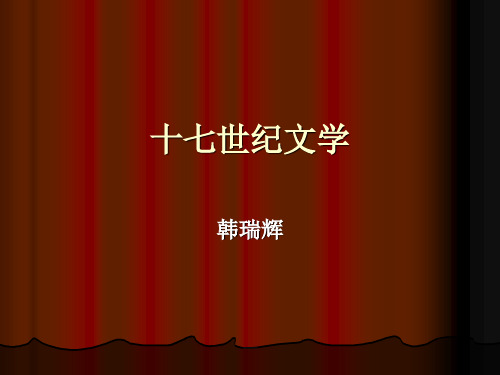
让· 拉封丹 德·
让· 拉封丹(1621—1695)的 德· 《寓言诗》(1668—1694)力图 反映17世纪下半叶的法国社会,这是 “一部巨型喜剧,幕数上百,宇宙是它的 舞台,人、神、兽、一切都在其中扮演某 个角色”。
尼古拉· 布瓦洛
尼古拉· 布瓦洛(1636—1711)是 古典主义的理论家。《诗的艺术》(16 74)提出了古典主义的美学原则,成为 古典主义的艺术法典。他规定理性是文学 创作的基本原则,必须模仿自然,自然指 宫廷和城市生活;古希腊古罗马作家的创 作经验是最高准则,必须遵守“三一律”; 文学体裁有高低之分。
巴罗克文学的代表作家
巴罗克文学起源于意大利和西班牙,兴盛于法国。意大利 巴罗克文学的代表是诗人贾姆巴蒂斯塔· 马里诺(156 9—1625)。他的长诗《阿多尼斯》(1623)叙 述爱神维纳斯和美少年阿多尼斯的爱情纠葛,其中编织了 许多插曲,诗句华丽,形成一种“马里诺诗体”,各国诗 人群起仿效。 法国的巴罗克文学分小说和诗歌两个方面。小说的代表是 奥诺雷· 于尔菲(1568—1625),他的小说 德· 《阿丝特蕾》(1607—1627)描写牧羊人塞拉东 与情人牧羊女阿丝特蕾的爱情纠葛。小说描写的是理想化 的田园牧歌式生活,其中有无数的插曲和缠绵的对话,写 成5大卷60册。诗歌方面的代表是阿格里帕· 多比涅 (1552—1630)和马莱布(1555—162 8)。
五、巴洛克艺术
十七世纪欧洲文学
17世纪流行在西欧、特别是法国的一种文学思潮。 因为它在文艺理论和创作实践上以古希腊、罗马 文学为典范,而被称为“古典主义”。在法国, 从17世纪初年至1660年左右,是古典主义逐步 形成的阶段,主要表现为古典主义文学语言的定 型和各种文学作品体裁的确立。 法国古典主义文学达到全欧的先进水平。成为各 国的楷模。古典主义文学产生的社会基础是法国 的专制君主制。他的思想基础是唯理主义。悲剧 作家高乃依、拉辛,喜剧作家莫里哀等。
17世纪三大文学现象的基本成就

17世纪三大文学现象的基本成就
17世纪欧洲文学的主要成就:英国资产阶级革命文学(清教徒文学)、法国古典主义文学、巴洛克文学。
法国古典主义文学
17世纪的古典主义文学最早出现于法国,是流行于西欧,特别是法国的一种带有浓厚封建色彩的资产阶级文学思潮。
因为它在文艺理论和创作实践上以古希腊古罗马文学为典范,故称“古典主义”。
高乃依,法国剧作家,古典主义的创始者,代表作有《熙德》。
莫里哀,法国古典主义喜剧家,代表作有《伪君子》《唐璜》《贵人迷》和《吝啬鬼》。
《吝啬鬼》塑造了著名的吝啬鬼典型阿巴贡。
英国清教徒文学
17世纪的英国文学以体现清教徒思想的作品最为出色,这是英国资产阶级革命的产物,被称为英国清教徒文学。
这场革命是在宗教的外衣下进行的,斗争主要在保王的国教与革命的清教之间展开。
17世纪,新兴资产阶级主张纯洁教会,清除国教中天主教的影响,因而其有“清教徒”之称。
他们以《圣经》作为斗争的思想武器,主要代表人物为约翰·弥尔顿和约翰·班扬。
约翰·弥尔顿,英国诗人,恩格斯称其为“第一个为弑君辩护的人”,是文艺复兴运动和18世纪启蒙思想运动的桥梁,代表作有《失乐园》。
巴洛克文学
巴洛克文学特指17世纪在欧洲各国广泛流行的一种贵族形式主
义的文学,它是由封建制度的危机引起的。
巴洛克文学起源于意大利、西班牙,兴盛于法国。
在艺术形式上涉及了诗歌、戏剧、小说等各种体裁。
卡尔德隆,西班牙作家,代表作有《人生如梦》。
资产阶级革命时期英国文学

+ AS virtuous men pass mildly away, And whisper to their souls to go,
Whilst some of their sad friends do say, "Now his breath goes," and some say, "No."
+ So let us melt, and make no noise, No tear-floods, nor sigh-tempests move ;
'Twere profanation of our joys To tell the laity our love.
+ Moving of the earth brings harms and fears ; Men reckon what it did, and meant ;
+ It presents the author’s political views in allegorical religious form. It is built on the stories and myths in the Bible through which western people have sought to understand the meaning of their experience of life.
+ It is a school of highly intellectual poetry marked by bold and ingenious conceits, incongruous imagery, complexity of thought, frequent use of paradox and often deliberate harshness or rigidity of expression. It was a reaction against the deliberately smooth and sweet tones of much 16th century verse. A metaphysical poem is always tightly woven and is brief but intense meditations characterized by striking use of wit, irony, and word play. So it is poetry of the library or poetry for the few.
英国文学7个时期 各自特点介绍
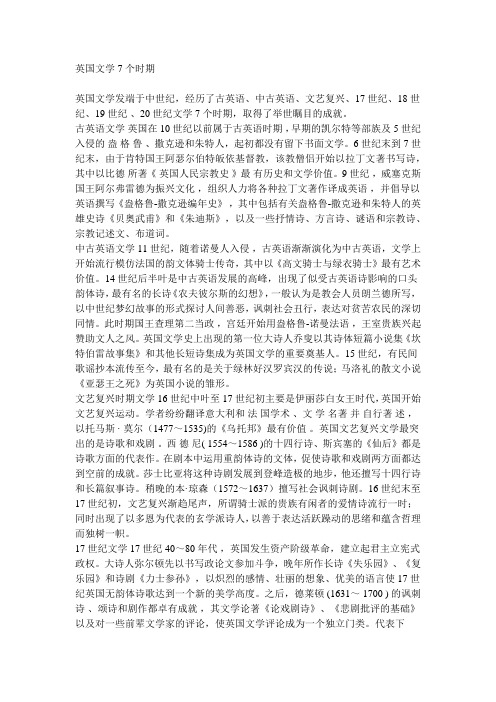
英国文学7个时期英国文学发端于中世纪,经历了古英语、中古英语、文艺复兴、17世纪、18世纪、19世纪、20 世纪文学 7 个时期,取得了举世瞩目的成就。
古英语文学英国在10世纪以前属于古英语时期,早期的凯尔特等部族及 5 世纪入侵的盎格鲁、撒克逊和朱特人,起初都没有留下书面文学。
6世纪末到7世纪末,由于肯特国王阿瑟尔伯特皈依基督教,该教僧侣开始以拉丁文著书写诗,其中以比德所著《英国人民宗教史》最有历史和文学价值。
9世纪,威塞克斯国王阿尔弗雷德为振兴文化,组织人力将各种拉丁文著作译成英语,并倡导以英语撰写《盎格鲁-撒克逊编年史》,其中包括有关盎格鲁-撒克逊和朱特人的英雄史诗《贝奥武甫》和《朱迪斯》,以及一些抒情诗、方言诗、谜语和宗教诗、宗教记述文、布道词。
中古英语文学 11世纪,随着诺曼人入侵,古英语渐渐演化为中古英语,文学上开始流行模仿法国的韵文体骑士传奇,其中以《高文骑士与绿衣骑士》最有艺术价值。
14世纪后半叶是中古英语发展的高峰,出现了似受古英语诗影响的口头韵体诗,最有名的长诗《农夫彼尔斯的幻想》,一般认为是教会人员朗兰德所写,以中世纪梦幻故事的形式探讨人间善恶,讽刺社会丑行,表达对贫苦农民的深切同情。
此时期国王查理第二当政,宫廷开始用盎格鲁-诺曼法语,王室贵族兴起赞助文人之风。
英国文学史上出现的第一位大诗人乔叟以其诗体短篇小说集《坎特伯雷故事集》和其他长短诗集成为英国文学的重要奠基人。
15世纪,有民间歌谣抄本流传至今,最有名的是关于绿林好汉罗宾汉的传说;马洛礼的散文小说《亚瑟王之死》为英国小说的雏形。
文艺复兴时期文学 16世纪中叶至17世纪初主要是伊丽莎白女王时代,英国开始文艺复兴运动。
学者纷纷翻译意大利和法国学术、文学名著并自行著述,以托马斯 ·莫尔(1477~1535)的《乌托邦》最有价值。
英国文艺复兴文学最突出的是诗歌和戏剧。
西德尼( 1554~1586 )的十四行诗、斯宾塞的《仙后》都是诗歌方面的代表作。
英国文学知识简单整理
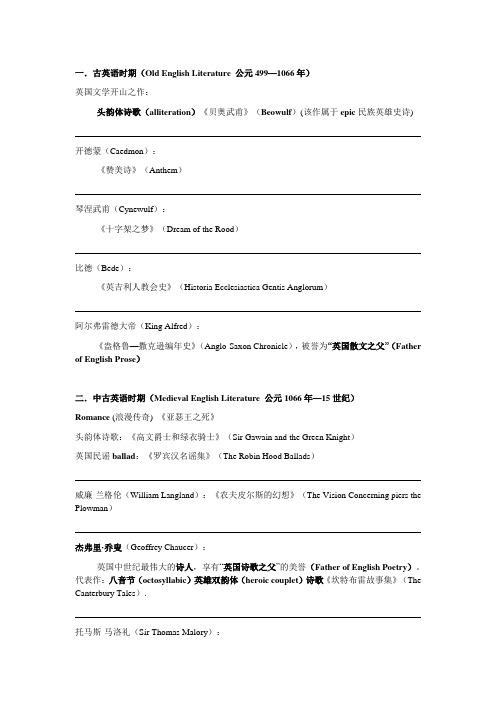
一.古英语时期(Old English Literature 公元499—1066年)英国文学开山之作:头韵体诗歌(alliteration)《贝奥武甫》(Beowulf)(该作属于epic民族英雄史诗)开德蒙(Caedmon):《赞美诗》(Anthem)琴涅武甫(Cynewulf):《十字架之梦》(Dream of the Rood)比德(Bede):《英吉利人教会史》(Historia Ecclesiastica Gentis Anglorum)阿尔弗雷德大帝(King Alfred):《盎格鲁—撒克逊编年史》(Anglo-Saxon Chronicle),被誉为“英国散文之父”(Father of English Prose)二.中古英语时期(Medieval English Literature 公元1066年—15世纪)Romance (浪漫传奇) 《亚瑟王之死》头韵体诗歌:《高文爵士和绿衣骑士》(Sir Gawain and the Green Knight)英国民谣ballad:《罗宾汉名谣集》(The Robin Hood Ballads)威廉·兰格伦(William Langland):《农夫皮尔斯的幻想》(The Vision Concerning piers the Plowman)杰弗里·乔叟(Geoffrey Chaucer):英国中世纪最伟大的诗人,享有“英国诗歌之父”的美誉(Father of English Poetry)。
代表作:八音节(octosyllabic)英雄双韵体(heroic couplet)诗歌《坎特布雷故事集》(The Canterbury Tales).托马斯·马洛礼(Sir Thomas Malory):英国15世纪优秀的散文家,代表作为《亚瑟王之死》(Le Morte d’Arthur)三.文艺复兴时期(Renaissance 15世纪末—17世纪)托马斯·莫尔(Thomas More):伟大的人文主义者,代表作:《乌托邦》(Utopia),《国王爱德华五世悲戚的一生》(The painful Life of Edward Ⅴ).托马斯·魏厄特(Thomas Wyatt)和亨利·霍华德(Henry Howard)的十四行诗(Sonnet).前者将意大利十四行诗引入英国;后者在此基础上,发展了英国十四行诗歌。
17世纪资产阶级革命和王超复辟时期英美文学

17世纪资产阶级革命和王超复辟时期英美文学资产阶级革命英国资产阶级革命是从1640年查理一世召开新议会的事件开始到1688年议会反对派发动宫廷政变(又称光荣革命)结束,以新贵族阶级为代表推翻封建专制统治建立起英国资本主义制度的社会革命。
推翻了封建统治,并在1689年颁布文献《权利法案》以法律形式对王权进行明确制约,确立了议会君主立宪制。
15世纪末到17世纪初,随着英国海外贸易的发展和原始的资本积累,英国的资本主义迅速发展起来。
资本主义的发展促使资产阶级新贵族形成,他们同资产阶级有着共同的利益,但17世纪时,斯图亚特王朝理厉行专制统治,经常触犯资产阶级的利益,宗教专职政策也进一步激化了阶级矛盾,最终导致了1640年英国资产阶级革命的爆发。
原因1.英国经济的发展,富裕阶层、新贵族的成长,使他们要求政治上当权,经济上发展市场经济。
2.斯图亚特王朝詹姆士一世、查理一世的专制统治严重阻碍了发展,激化了一些新生的社会矛盾。
3.英国民族国家发展期间出现的国教与新教之间、君主专制与议会传统之间的矛盾没有得到解决并且日益尖锐。
客观原因1.专制统治阻碍发展。
2.新贵族和富裕阶层势力的壮大。
特点1 宗教旗帜鲜明。
值得注意的是,在第一次内战期间王党与议会阵营之间最大的差别并不在于双方的阶级构成,而在于双方的宗教信仰。
总的来说,信仰清教者支持议会,信仰国教者则支持国王。
2 传统观点认为,在第一次内战期间,英国资产者与新贵族结成联盟共同反对英国君主专制。
不过,在内战过程中,无论是王党还是议会,双方的支持者中均有资产者、商人、工匠和农民等,支持谁取决于英国地方乡绅的态度,而阶级分化相比宗教分野并不显著,因此对于革命的阶级性这一观点仍有待商榷。
3 革命曲折反复,具有长期性、复杂性、反复性和艰巨性。
4 开辟了革命的新时代。
结果1688年“光荣革命”标志着英国革命的结束。
1689年的《权利法案》使英国确立了君主立宪制。
意义影响英国革命确立了“议会制君主立宪制(议会君主制)”、“内阁制”,颁布《权利法案》。
英国文学史(启蒙运动时期)

英国文学史(启蒙运动时期)这个部分讲启蒙运动(The Enlightenment Movement)时期的文学,还是照常,先提历史和文学背景,看看英国什么情况。
一、历史背景18世纪的英国,刚刚经历过资产阶级革命,也就是光荣革命(1688),光荣革命制宪,英国政体由君主专制转化为君主立宪,大权从国王手中落到了议会手上,资本主义发展迅速,资产阶级地位很高,而且18世纪英国开始了工业革命,在思想上面强调理性,这也是启蒙的主旨,那么文学上也会发生相应的改变,上个时期主要是德莱顿的古典主义文学时期,启蒙运动一开,文学基本就变为宣扬思想的武器,随着启蒙的深入,作家们也开始逐渐抛弃这种文学风格。
当然,18世纪初期古典主义还是在的,但是受启蒙思想的影响,古典主义变成了新古典主义(Neo-classicism),代表人物就是亚历山大·蒲伯(Alexander Pope),这货受德莱顿影响很大,后面具体说。
同时,这一时期有另一种文学体裁出现了,就是随着17世纪的报刊文学(大多都是写实小说)的发展,到了18世纪,逐渐演变成了小说,可以说是原来散文的一种变体。
这个时期的小说一般是现实主义小说,这些玩意都具有启蒙性质,初期的现实注意小说流浪汉题材(Picaresque Novel)很流行90,诗歌方面就是依旧是英雄双行体(heroic couplet)这种诗歌形式,始于乔叟,中间又经马洛、斯宾塞发展,最后到蒲伯手里有个完善。
戏剧上面那,过去都是以无韵诗为体的戏剧,18世纪改用偶句诗,时间地点格式上得到了统一。
总的来说18世纪的文学可以分为三个阶段:第一阶段主要新古典主义文学+报刊文学(就是写在报纸上的那种散文性质的文章)+现实主义小说,第二阶段:现实主义小说得到巨大发展,第三阶段,由于启蒙运动搞革命没有出现启蒙思想家想象中的理想社会,整个英国陷入一种充满悲观情绪的状态,这个时候感伤主义文学(Sentimentalism)和前浪漫主义时期(Pre-Romanticism)到来。
英国文学
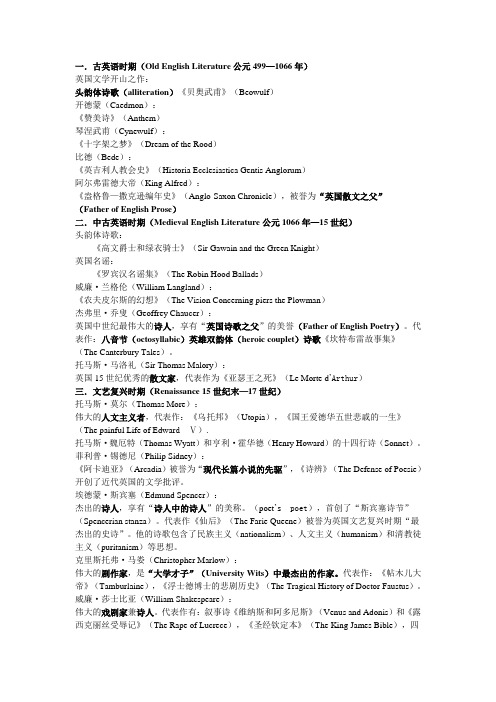
一.古英语时期(Old English Literature 公元499—1066年)英国文学开山之作:头韵体诗歌(alliteration)《贝奥武甫》(Beowulf)开德蒙(Caedmon):《赞美诗》(Anthem)琴涅武甫(Cynewulf):《十字架之梦》(Dream of the Rood)比德(Bede):《英吉利人教会史》(Historia Ecclesiastica Gentis Anglorum)阿尔弗雷德大帝(King Alfred):《盎格鲁—撒克逊编年史》(Anglo-Saxon Chronicle),被誉为“英国散文之父”(Father of English Prose)二.中古英语时期(Medieval English Literature 公元1066年—15世纪)头韵体诗歌:《高文爵士和绿衣骑士》(Sir Gawain and the Green Knight)英国名谣:《罗宾汉名谣集》(The Robin Hood Ballads)威廉·兰格伦(William Langland):《农夫皮尔斯的幻想》(The Vision Concerning piers the Plowman)杰弗里·乔叟(Geoffrey Chaucer):英国中世纪最伟大的诗人,享有“英国诗歌之父”的美誉(Father of English Poetry)。
代表作:八音节(octosyllabic)英雄双韵体(heroic couplet)诗歌《坎特布雷故事集》(The Canterbury Tales)。
托马斯·马洛礼(Sir Thomas Malory):英国15世纪优秀的散文家,代表作为《亚瑟王之死》(Le Morte d’Arthur)三.文艺复兴时期(Renaissance 15世纪末—17世纪)托马斯·莫尔(Thomas More):伟大的人文主义者,代表作:《乌托邦》(Utopia),《国王爱德华五世悲戚的一生》(The painful Life of Edwar d Ⅴ).托马斯·魏厄特(Thomas Wyatt)和亨利·霍华德(Henry Howard)的十四行诗(Sonnet)。
Part3资产阶级革命和王政复辟时期的英国文学

It tells how Christ overcame Satan.
the most perfect example of the verse drama after the Greek style in English.
Ⅱ《 Songs and Sonnets 》歌谣与十四行诗 《A Valediction: Forbidding Mourning》分别:莫忧伤 《Holy Sonnets》神圣十四行诗 《Death, be not Proud》死神莫骄妄 《The Sun Rising》日出
the only generally acknowledged epic in English literature since Beowulf. The conflict is between human love and spiritual duty. The freedom of the will is the keystone of Milton’s creed(纲领).
John Dryden 约翰 德莱顿 1631-1700
He was the forerunner of the English classical school of literature in the 18th century. He was the greatest poet between Milton and Pope. For almost 20 years, he was England’s poet laureate. He established the heroic couplet as the fashion for satiric, didactic(说教的) and descriptive poetry. He was called the father of English criticism.
专八 TEM8 英国文学知识
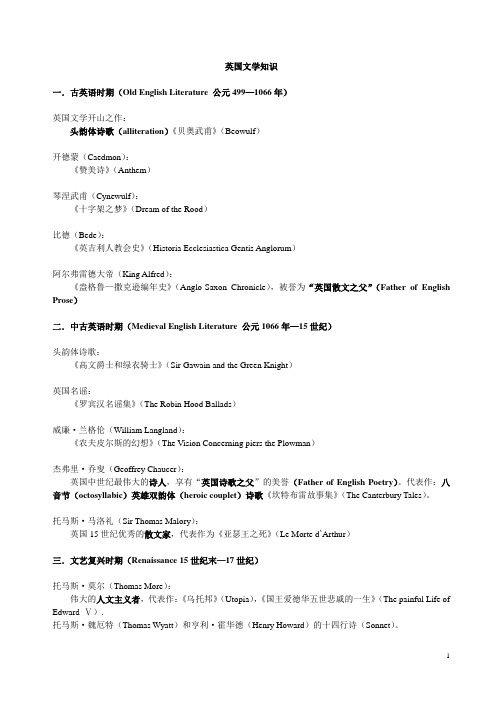
英国文学知识一.古英语时期(Old English Literature 公元499—1066年)英国文学开山之作:头韵体诗歌(alliteration)《贝奥武甫》(Beowulf)开德蒙(Caedmon):《赞美诗》(Anthem)琴涅武甫(Cynewulf):《十字架之梦》(Dream of the Rood)比德(Bede):《英吉利人教会史》(Historia Ecclesiastica Gentis Anglorum)阿尔弗雷德大帝(King Alfred):《盎格鲁—撒克逊编年史》(Anglo-Saxon Chronicle),被誉为“英国散文之父”(Father of English Prose)二.中古英语时期(Medieval English Literature 公元1066年—15世纪)头韵体诗歌:《高文爵士和绿衣骑士》(Sir Gawain and the Green Knight)英国名谣:《罗宾汉名谣集》(The Robin Hood Ballads)威廉·兰格伦(William Langland):《农夫皮尔斯的幻想》(The V ision Concerning piers the Plowman)杰弗里·乔叟(Geoffrey Chaucer):英国中世纪最伟大的诗人,享有“英国诗歌之父”的美誉(Father of English Poetry)。
代表作:八音节(octosyllabic)英雄双韵体(heroic couplet)诗歌《坎特布雷故事集》(The Canterbury Tales)。
托马斯·马洛礼(Sir Thomas Malory):英国15世纪优秀的散文家,代表作为《亚瑟王之死》(Le Morte d’Arthur)三.文艺复兴时期(Renaissance 15世纪末—17世纪)托马斯·莫尔(Thomas More):伟大的人文主义者,代表作:《乌托邦》(Utopia),《国王爱德华五世悲戚的一生》(The painful Life of Edwar d Ⅴ).托马斯·魏厄特(Thomas Wyatt)和亨利·霍华德(Henry Howard)的十四行诗(Sonnet)。
- 1、下载文档前请自行甄别文档内容的完整性,平台不提供额外的编辑、内容补充、找答案等附加服务。
- 2、"仅部分预览"的文档,不可在线预览部分如存在完整性等问题,可反馈申请退款(可完整预览的文档不适用该条件!)。
- 3、如文档侵犯您的权益,请联系客服反馈,我们会尽快为您处理(人工客服工作时间:9:00-18:30)。
Metaphysical poetry
+ It is a school of highly intellectual poetry marked by bold and ingenious conceits, incongruous imagery, complexity of thought, frequent use of paradox and often deliberate harshness or rigidity of expression. It was a reaction against the deliberately smooth and sweet tones of much 16th century verse. A metaphysical poem is always tightly woven and is brief but intense meditations characterized by striking use of wit, irony, and word play. So it is poetry of the library or poetry for the few.
资产阶级革命时期英国文学
+ It presents the author’s political views in allegorical religious form. It is built on the stories and myths in the Bible through which western people have sought to understand the meaning of their experience of life.
+ Metaphysical poets
资产阶级革命时期英国文学
Cavalier poets
+ Cavalier poets: royalists whose poetry was marked by courtliness, urbanity and polish. Their poems reflected the extravagance and moral looseness of court life.
+ The work contains Milton’s ambition, his love of freedom and his deep-seated Puritanism.
资产阶级革命时期英国文学
Paradise lost
+ The story is about Satan’s revolt against God and man’s loss of paradise. The poem begins with a detailed description of Satan and his followers re-assembling in hell and scheming for revenge against God. Though the purpose of the poem is to justify the ways of God to men, as Satan tries to justify himself by posing as a rebel against tyranny, Milton apparently unconsciously makes the devil serve as his mouthpiece. Throughout the epic Milton shows a Puritan’s revolt against the established doctrines of the Catholics and the Anglican Church by interpreting the story in the Bible freely for himself.
资产阶级革命时期英国文学
John yan
+ Puritan writer who participated in the struggle against the corrupt, dissolute feudal-aristocratic regimes of Charles II and James II.
+ Thomas Carew, Sir John Suckling and Richard Lovelace were famous Cavalier poets.
资产阶级革命时期英国文学
John Donne (1572-1631)
+ Metaphysical poet + His poetry is noted for its
+ Poet: 24 sonnets
+ Works include: Paradise Lost, Paradise Regained, Samson Agonistes.
资产阶级革命时期英国文学
+ In literature, Milton occupied a transitional position. He came immediately after the Elizabethan period and absorbed the humanist culture; at the same time, he was a faithful puritan in his belief. In his poetry, he blends the tradition of the Renaissance with the spirit of revolutionary struggle and the ideas of puritanism.
+ So let us melt, and make no noise, No tear-floods, nor sigh-tempests move ;
'Twere profanation of our joys To tell the laity our love.
资产阶级革命时期英国文学
Pilgrim’s progress
+ The work has often been read and appreciated as a religious allegory, though many critics have noted the many realistic pictures of the personified figures and allegorical places in the book, pointing out that the people Christian meets on the way are such as might be seen in Bunyan’s day in Restoration England. The satires focus upon the ruling class. For example, At Vanity Fair Bunyan gives us a symbolic picture not only of London at the time of the Restoration but the of the English society in general where all things were brought and sold and where cheating and roguery, murders and adulteries were normal. No wonder that the great critical realist of the 19th century Thackery employed Vanity Fair as the title for his important novel.
资产阶级革命时期英国 文学
2020/12/18
资产阶级革命时期英国文学
John Milton
+ Pamphleteer, a supporter of Oliver Cromwell.
+ Milton argued for religious freedom and stood against the authority of the bishops.
vibrancy of language and inventiveness of metaphor----conceit.
资产阶级革命时期英国文学
conceit
+ When a simile or metaphor is elaborate or far-fetched and strikes you at first as being inappropriate, it is called a conceit. Though it is unexpected, the comparison is intriguingly right. The metaphor is so contrived and intellectually convoluted that the very unlikeness between two things remains paramount. By turning upon a surprising and ingenious analogy between apparently unrelated areas of experience, the metaphysical poet is able to display their wit. The best metaphysical conceits are telling, effective and original.
